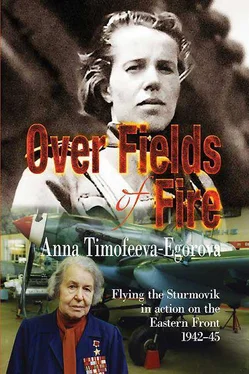Trpinac, like a campaigner, began to talk about the Russian doctor in the camp, and people from all blocks began to come to Sinyak one after another for treatment: they said he knew how to raise the dead! Georgiy Fedorovich cured perforated ulcers, pleurisy, osteomyelitis, performed surgery for cancer and thyroid diseases. Each day there were up to five operations and more than fifty dressings. The doctor was terribly tired, but the knowledge that there were more than a thousand and a half sick and wounded men in the hospital did not allow him to take any rest.
And so Sinyakov had no fear of the Commandant’s threats, and repeated his demand… Finally the Gestapo men allowed Doctors Sinyakov and Trpinac to treat me…
Twilight. The door opened with a creak, and a German Feldwebel 168 168 Sergeant.
came in like a ghost.
“Wow! It smells of a dead corpse here already”, he said, taking a drag on his cigarette, then leaned over the bunk and exclaimed, astonished: “A thousand devils! What does it take to kill these Russian witches! She’s breathing… skinned alive but still breathing!”
I really did smell like a dead corpse. The heavy burns on my face, arms and legs were covered with pus. Later that would save me from rough scars formed where the burns were.
“Come in!” The Feldwebel told a man standing by the door. It was the ‘Russian Doctor’ — that was what they called 2nd Class Army Surgeon Georgiy Fedorovic Sinyakov.
Carrying out instructions from a clandestine organisation of Russian POWs, Doctor Sinyakov was preparing escapes. In the hospital there were always five or six weakened POWs, who were to be fed up before an escape, helped to dry some bread for the journey, provided with a watch or a compass.
The first escape was organised in the camp in the spring of 1942. Then 5 men escaped, and three of them were airmen. Sinyakov said that he would remember for the rest of his life one of those escapees — a chap aged about 23. He’d been brought to the camp in very bad condition, with frostbitten toes on both feet and a high fever. His plane has been set afire deep behind the lines and he had to use a parachute. The pilot had walked through the forest for more than two days and had got his feet frostbitten: his fur-lined flying boots had been torn away during the jump from his plane. Having worn himself out he decided to have a rest, dozed off, and then two German shepherd dogs pounced on him… The Gestapo men transported him to the camp hospital. The guy had a large scalp wound on his head. Sinyakov told the Gestapo men the POW had skull and brain damage, and that he was unconscious. The doctor knew that the German doctors would easily notice his deceit the next day, but was doing it with his eyes open. In the night Georgiy Fedorovich and the medics replaced the pilot with a soldier who had died of wounds. They amputated half of the pilot’s feet, for gangrene had already set in. And then, having recuperated, the pilot first learned to walk and then made an escape. It had become another of the doctor’s victories.
Later I found out that once an alarmed guardsman with an interpreter from the POWs appeared unexpectedly before Georgiy Fedorovich and shouted: “To the commandant, immediately!”
You didn’t argue in the camp: if you were ordered to the commandant — you went. Why was there such a rush? But indeed business had been really urgent: some object had fallen into the trachea of the son of one of the Gestapo guards — a button or something. No one, actually, knew what the boy had swallowed. The boy was choking, immediate surgical intervention was required, but all the doctors were dismissing it as hopeless. Then the Germans remembered the ‘Russian Doctor’, remembered that this wonder-physician had been curing hopeless patients in the camp environment without essential instruments or assistants. Of course, he was a Russian — a representative of a ‘lower race’, but the Nazis had no choice. And did Doctor Sinyakov have a choice? An escort walked him — barefoot and ragged — to the spot. The Gestapo man said to him: “If you don’t save my son — you’ll be shot immediately”, and summoned all the camp doctors as witnesses. Had Sinyakov been ordered to operate on the father, a Gestapo man, a sadist and a notorious scoundrel, he would have said “No” but this was a child. Granted he was a German but all the same a child who was not to blame for his father being a Fascist. And he agreed to operate, immediately at that, for the child was nearly passing out. Georgiy Fedorovich asked for a piece of wire, did some trick with it, inserted the wire down the trachea and pulled out the button.
The man, staggering from constant malnutrition, suffering physically and morally every day but capable of preserving his clear mind and his craft, had saved the boy. And when death had retreated from the latter, another miracle occurred. The boy’s mother — a ‘pure-blooded Aryan’, haughty and swaggering, fell on her knees in front of the Russian doctor and kissed his hand, which had just put the instrument aside. Since then Doctor Sinyakov had obtained a kind of independence and right to state his requests. It had also played a role in Germans allowing him and Professor Trpinac to treat me.
Not knowing yet who these people were, having barely seen them at first, I understood that there were friends in front of me. Georgiy Fedorovich and Pavle Trpinac not only healed me, procuring medication for me, they tore off bread from their meagre camp ration. I will never forget that human generosity! I remember Trpinac bringing biscuits himself or sending his compatriot Zhiva Lazin — a peasant from the Banat — with a small bowl of kidney beans. In spite of everything, all the POWs except for the Russians were receiving food parcels and medication from the International Red Cross. The Soviet Union had withdrawn from that organisation. Stalin said then: “There are no POWs of ours — there are traitors…”
When Trpinac managed to get a Sovinformbureau communiqué, he would put on his gown, shove a cigarette into the guard’s hands so the latter would let him through to me, and would step quickly into the cell. “Oh, good news have I”, Pavle would say, mixing words in his native tongue and Russian ones, “The Red Army is gloriously advancing westward…”
Once he brought me a topographical map. The line of advance of the Soviet troops towards the Oder river was shown on it with a red pencil. Pavle fell to his knees, his back to the door, and showing me the red arrow directed with its point towards Berlin, said: “Soon they will come for us!”
At that moment the door opened and the Feldwebel ran into the cell cursing, but Trpinac managed to hide the map, and, pretending he had finished the dressing, walked out in silence. Next time the professor brought a piece of the Pravda newspaper 169 169 Editor’s note — for many decades, the most popular Soviet newspaper.
in which there was a report about some Colonel Egorov’s heroic feat.
“Good news is a medicine too”, he said assuming my namesake was my husband or a relative. My dear Pavle of course did not know there as many Egorovs in Russia as Ivanovs or Stepanovs!
Sometimes Trpinac told me about his wonderful homeland, Yugoslavia — told me about his family and sighed heavily. His sister, Melka, was hanged by the Fascists in 1941. His second sister, Elena, joined the partisans with her daughter, in the future a national poet of Yugoslavia, Mira Aleckovic. The fascists had arrested Pavle himself on the podium where he was giving a lecture on Biochemistry at Belgrade University. Pavle’s wife Milena was still in Belgrade. Trpinac had been in the Küstrin camp since 1942 and before that he had been tormented in various jails. Trpinac hated Fascism with all his soul and fought against it as best as he could. He strongly believed in the final victory of the Red Army, made no secret of it and with no concerns for his own safety actively spread anti-Fascist propaganda among the POWs.
Читать дальше












